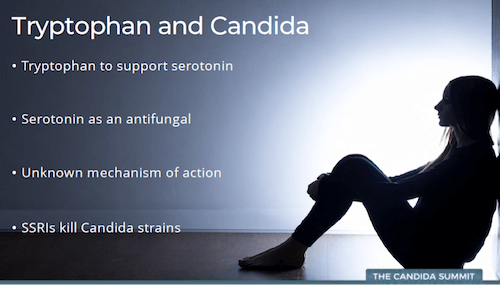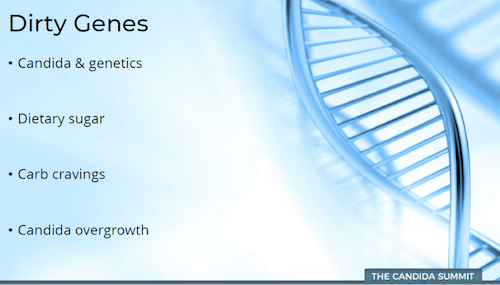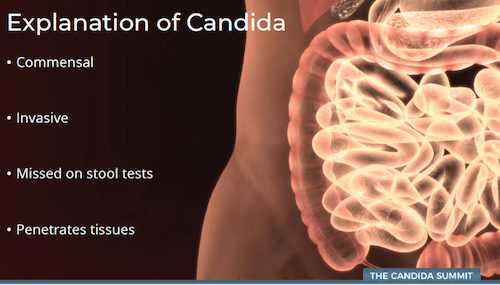My interview on anxiety on The Candida Summit with host Evan Brand, addresses anxiety, the tie in to low serotonin and the sugar cravings aspect. I was so excited to find a connection between serotonin and candida and share this in our interview.
with low serotonin you’ve got the mental anxiety – the worry, the ruminating thoughts, the obsessive thinking, the reprocessing, insomnia, lying awake in bed, trying to shut down the busy mind. And the two amino acids I use for this is tryptophan; that’s my first choice. And my second choice is 5-HTP. That being said, some people do better on one versus the other.
The reason I like tryptophan is 5-HTP can raise cortisol and make people who are wired/tired feel a little bit more wired/tired. So until I’ve seen cortisol results in saliva, I like to use tryptophan first.
But let me share some of this interesting research that I’ve found. And why I’m so excited about it is because as I said earlier, I will use the amino acids first before I’m specifically addressing the candida. But it seems like using tryptophan first, as well as helping with the low serotonin, it’s starting to have an impact on the candida, which I didn’t know about, until I did the research for this. So thank you for inviting me to speak. It just reinforces what I know about the amino acids – that they are pretty powerful.
There was a study done in 2003, and the title is Antifungal Properties of Serotonin Against Candida species. And they looked at various different candida strains: albicans, glabrata, tropicalis, and a few others. And they exposed these candida strains to serotonin. The study concludes: “Serotonin showed antifungal activity towards all isolates of candida.”
What they didn’t know is what the mechanism of action was. They stated: “Identifying the mode of action would be of great help in developing and research new antifungal drugs.” I don’t agree with that. I’m just excited to see that there is this connection with serotonin, which reinforces how beneficial tryptophan is.
Of course, my solution is to provide serotonin support via diet, exercise and the use of the targeted individual amino acid tryptophan or 5-HTP.
You can read more about this serotonin-candida connection in my blog post: Symptoms, nutrient malabsorption, worsening psychiatric symptoms and the serotonin connection
In our interview I also discuss how I use the amino acids and how tryptophan/5-HTP as well as GABA, DPA, tyrosine and glutamine, can actually help with so much of the sugar craving we see in candida, PLUS how I use this approach to gauge when candida is really serious.
EMFs and the dangers of 5G – and candida
Dr. Schaffner talks about EMFs and the dangers of 5G and shares how they are protecting the Sophia Institute Clinic (which she shares with Dr. Dietrich Klinghardt):
What we have done at the clinic—and again, this is an evolving art—the two things that I think are going to make the most difference in what we can do right now is, first, of course we always say avoid exposure, try to distance yourself. Distance is your friend with any technology, when we’re looking at EMF.
But we actually shielded the clinic. We have a cell phone tower within a mile of the clinic. And so, we wanted to be mindful of that exposure. We ask everybody to turn off their cell phones when they come in to the clinic. And we don’t have Wi-Fi. So everything is ethernet corded. And then, we don’t have cell phone exposure while we’re practicing.
But we do two things that I think people should be aware of. And one is we use a type of graphite paint. It’s called YSHIELD. And that actually comes from Germany. And it has properties to, essentially, try to create a Faraday cage environment and block the incoming microwave radiation. And so, that has to be grounded, of course. And you want to always work with somebody who knows what they’re doing with this technology. Because if you don’t do it right, you can actually increase your exposures or create an unhealthy environment.
And then, Dr. Klinghardt works with the woman who creates these silver-lined curtains that actually help to block the microwave radiation coming in through the windows.
There’s a really great website—LessEMF has a lot of this technology. And then, YSHIELD, you can Google, I think it’s yshield.com. And then, the silver-lined curtains, I believe, is a fabric called, Swiss Shield. And so, you can either make them yourself or hire somebody to do that.
Learn more about candida, low serotonin, low melatonin, and your glymphatic system in the second half of Dr. Schaffner’s interview.
Candida, sugar cravings and COMT and MAOA genes
Evan Brand brings up the topic of sugar and carbs in the diet with Dr. Ben Lynch in the Candida, sugar cravings and COMT and MAOA genes interview: No one is discussing the influence of the whole epigenetic piece, and how people and their decision making with foods could be influenced by their genes?
Dr. Ben Lynch shares how he has a unique angle on this fascinating topic of our genes and sugar/carb cravings:
It’s one that always ties back to what came first—the chicken or the egg, right? So what came first, the genetic propensity towards carbohydrate binging or addictive personalities for high-caloric dense foods like ice cream and cakes, doughnuts, pastries, which then leads us to candida?
And then, they go on all these candida treatments. And they beat it. And they’re all happy again. But then their genetic propensity drives them yet again for the yeast overgrowth and the food binging.
He gives an example of how some people, when they’re down and out, may be drawn to sugar and carbs to self-medicate (this is something I see with my anxious clients all the time):
They’ll hit the chocolate. They’ll hit the doughnuts, the ice cream to make them feel good. And what these do is they spike your dopamine.
You’re not really aware of it, but you just do it. And you know you shouldn’t do it. But what happens here is, is some individuals, they have genes, which eliminate their dopamine out of their body pretty quickly. This gene is called COMT. And one of its jobs is to move dopamine out. You don’t want to always have neurotransmitters in your brain. That’s not good.
So some of these folks are born with a COMT gene that actually works faster, which is really good because they can calm down really quick in stressful environments. They can perform at a high level in stressful situations like surgeons, or EMT, or firefighters, or policemen, policewomen. They strive in these high-risk, highly-attentive situations.
But when they come home, everything’s a low normal. And they need that hit of dopamine. So they might come home and binge on sugars and carbs to drive their dopamine back up. And that’s a significant one.
Dr Lynch also shares about another gene, MAOA, which deals with our serotonin:
If you have a faster MAOA gene, which moves through your serotonin, then you are craving carbohydrates, and you’re craving pastas, and breads, and all the things that candida love, and beer. These things which increase your tryptophan levels, support your MAOA, and thus your serotonin. These are two major foods that our candida love. And these are two very, very common genes in the population which predispose us to having these issues
Candida testing, parasites and intractable yeast overgrowth
Evan Brand asks this question about candida testing in the Candida, Mitochondrial Dysfunction, and Meditation interview with Dr. Dan Kalish: I’m guessing your statistics are similar to mine, 9 out of every 10 organic acids I find Candida overgrowth. Stool test, the GI map is missing a lot of Candida. Maybe you could help me understand why that’s happening.
Dr. Dan Kalish shares why candida testing can be challenging:
Because Candida can be commensal where it’s growing within the digestive tract itself, or it can be invasive where it penetrates into the tissue of the gut. And then it’s not going to be found in any of the stool tests. So stool tests can miss it easily. And in fact, the more severe it gets, the harder it is to find on a test.
That’s what happens with the yeast when it gets bad. It gets invasive. It goes up into the actual lining of the gut. So if it penetrates there, it causes leaky gut. But then it’s invasive, so it’s penetrating into the tissues. And you’re not going to see it in the stool. And that’s when it gets worse. In fact, it’s going to cause more symptoms. But then it’s almost impossible to find on the stool test.
He also shares this gem about intractable yeast overgrowth that just won’t go away:
You can have a Candida overgrowth, treat it and feel better, but have there be another underlying cause for the Candida. So there’s a lot of patients that will come to me and be like, “I had this Candida overgrowth. As long as I eat this radical and extreme and ridiculous diet, and take all these herbs, I’m fine. But every time I stop, it just comes back.”
Then, that leads the person to assume that it’s this horrific Candida overgrowth that’s never going to go away. And in those patients, there’s almost always Giardia, or Crypto [Cryptosporidium], or E. histo [Entamoeba histolytica], or some other bug that’s screwing up the ecology of the gut that’s allowing the Candida to keep coming back. So that’s just something to be on the lookout for.
If you feel like you have this intractable yeast overgrowth that just won’t go away, you should find a functional medicine doctor and do all the stool testing. Because you’re almost guaranteed there will be some other infection.
Click here to register for The Candida Summit which runs online from July 9-15, 2018!
Do share if you’ve successfully addressed candida overgrowth and how your symptoms improved and how bad your sugar cravings were.
Let us know if you’re EMF-aware and how addressing low serotonin has helped you.
If you have questions post them below in the blog comments.





I loved tryptophan and always used it for any depression or sleep problems for many years – even getting it from Canada when you couldn’t get it here. But several years ago, my doctor gave me a serotonin shot which she thought was better. It took my serotonin level from 24 to more than 150. I had a terrible reaction to it and had unbelievable anxiety for months and still have milder anxiety problems today. When I told the doctor, she said the shot couldn’t have done that so I never went back. If I try to take tryptophan now (5-HTP didn’t work for me) , the anxiety gets worse after a couple days of using it. Has this ever happened to anybody else? I’ve never found anybody who could help me with this! thank you…
Annie
I’m sorry to hear this. I have to admit I’ve not ever heard of anyone having a serotonin shot. I would like to know more so I can look into it and learn – and then I’ll provide feedback.
Where were you injected?
How did she measure your serotonin before and after 1) blood draw? plasma or platelets? or 2) urine?
You say you had a terrible reaction – other than the anxiety, what other reactions did you have?
Please confirm it was a serotonin injection and not 5-HTP?
Do you use gelatin or collagen as a supplement?
How much tryptophan causes your anxiety to get worse and which brand are you using?
Thanks
THANK YOU so much for answering. It happened in 2008 and so I might be a little fuzzy. But she did a blood test and my serotonin level was 24. She said that was very low and that many people were getting really good results with serotonin injections instead of taking more tryptophan. I got the shot, did some other things there and then left to go shopping. By the time I got to the store, I was having a weird pain across the top of my chest but I felt very mellow about it and went into the store. I kept dropping things in the store and thought something was wrong but I still felt pretty mellow about it. I don’t remember if it was that night or the next that I started having the most horrendous anxiety – so bad I couldn’t stay still, I had to keep walking or moving around. I couldn’t sleep, it felt like my heart was flipping over. And I couldn’t even drink cause I felt like I was gonna smother with the glass over my mouth and nose.
When I tried to call the doctor, they’d put me on hold and I was so agitated, I’d end up hanging up. When I finally talked to her, she said that couldn’t happen from the shot, so I never called her back. After a few months, another doctor tested my serotonin level and it was over 150.
The anxiety lasted really bad for a long time and gradually got better but I’ve never been the same. I haven’t even tried to take the tryptophan for several years now cause it would be OK for a few days and then I’d start getting anxiety again. I don’t remember the dose now but it was the same as I’d always taken before. And it was tryptophan cause when I’d tried to take 5-HPT years ago before this happened, it made me feel very weird so I never used that again…..
Here is info from the Holtorf Medical Clinic where I got the injection. “Treating a patient with prescription serotonin, given by injection or orally, increases serotonin levels in the brain without the side effects of prescription antidepressants, and can have a positive effect on depression”….
And thank you by the way cause after reading something you wrote, I realized that I was getting depressed when I was taking a lot of bone broth collagen, but not when I take bone broth protein powder. I never would have figured that out if not for you!! I appreciate you taking the time to answer me, it makes me feel not so isolated about this…..
Hi again. I did some research and found I was taking 500 MG of tryptophan at the time (not sure what brand tho). It was helping but I was still a little depressed so I asked if I should just take more tryptophan and thats when she told me about the shot. I also remembered that during that time when I was having so much anxiety, I would feel a lot of pressure in my head, like it was gonna explode. I wish I would have known about you back then!!
Annie
Thanks for elaborating and sorry to hear about those very unpleasant sounding symptoms.
I did check with them and got this feedback ” “Unfortunately, we are no longer able to obtain serotonin, just within the past few months. But yes, we used to compound it for oral use and purchased it from a manufacturer for injectable use. It worked wonders on most, but not everyone.”
I also checked with my colleagues and none except one had heard of or used serotonin injections for this purpose – so it’s unusual. One of my respected ND colleagues said this: “Some environmental medicine doctors do neutralization against hormones and neurotransmitters, including serotonin by intradermal injection. It’s not to raise serotonin levels but to neutralize against hormone/neurotransmitter sensitivities.”
This is all new to me so I’m afraid I don’t have a solution I could offer a client with this issues but I’m sure with some research a solution could be found. There is always a root-cause.
Dear Trudy,
Interesting point made about the OAT test often finding Candida but stool testing often not able to detect it. **Do the experts believe that the OAT test is usually accurate when it detects Candida?
Also interesting point that when Candida is intractable that there are likely bacteria and parasites present disturbing the bowel ecology.
**Are stool tests generally reliable in detecting bacteria and parasites?
**For intractable Candida cases, might it be worthwhile to take not only antifungals but also supplements that rid the body of harmful bacteria and parasites? Is testing critical in such cases or can one proceed based on symptoms?
Thanks so much.
Ellen
Most practitioners use a combination of testing, questionnaires (to determine symptoms) and response to protocols. That being said OAT is considered reliable for candida.
There are different types of stool tests and some are better for detecting some parasites and some are not so good. For example there is only one stool test that I know of that detects pinworm (Diagnostechs).
Often a combination product can be used – one that addresses both yeast and parasites. GI Microbx by DFH is one such product – I discuss this in my interview and why I like it.
I encourage you to tune in to the summit to learn more from the expert interviews. Register here http://healthaffiliate.center/739-29.html
Dear Trudy,
Thanks so much for your reply. I will be tuning in to the Candida summit – look forward to the info you will present on the combo product.
Many thanks also for notifying us about these summits as well as providing us with key points and overviews of the various presentations. In a world of information overload, your blog helps us stay up to date by presenting information in such a clear, concise, useful manner. Do not know where we would all be without you!
(Hope there is a summit on Histamine Intolerance soon.)
Hi Trudy,
Could you please tell us which website is the best one to use to analyze the raw genetic health data (SNPs) from the 23andme reports —via Ben Lynch or others? I believe Lynch used to like StrateGene but not sure about now…
Many thank you’s!
Lola